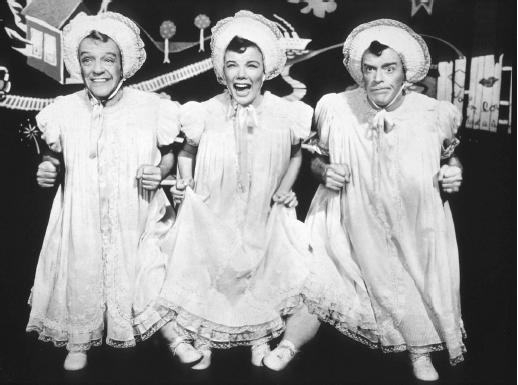Jack Buchanan - Actors and Actresses
Nationality:
British.
Born:
Helensburgh, Scotland, 2 April 1890.
Education:
Larchfield School, Helensburgh; Glasgow Academy.
Family:
Married 1) Saffro Arnau, 1915; 2) Suzie Bussett, 1949.
Career:
Amateur stage appearances while an office worker;
1911—professional debut in variety theater;
1915–17—toured in successful play
Tonight's the Night
; 1917—film debut in
Auld Lang Syne
; 1921—critical and popular acclaim for role in Charlot's
A—Z
musical revue in London; later on Broadway; 1920s—series of
leading roles in minor British films; 1929–30—appeared in a
few Hollywood films; 1931—built Leicester Square Theatre in London;
1932—directed (with Herbert Wilcox) first film,
Yes Mr. Brown
; late 1930s—began producing his own films; entertained troops
during World War II; 1953—sagging career restored by role in
Minnelli's
The Band Wagon
.
Died:
In London, 21 October 1957.
Films as Actor:
- 1917
-
Auld Lang Syne (Morgan) (as Vane)
- 1919
-
Her Heritage (Merwin) (as Bob Hales)
- 1923
-
The Audacious Mr. Squire (Greenwood) (as Tom Squire)

- 1924
-
The Happy Ending (Cooper) (as Capt. Dale Conway)
- 1925
-
Settled Out of Court ( Evidence Enclosed ) (Cooper) (as husband); Stage Stars Off Screen (short); A Typical Budget (Brunel—short); Bulldog Drummond's Third Round (Morgan) (as Capt. Hugh Drummond)
- 1927
-
Confetti (Cutts) (as Count Andrea Zorro)
- 1928
-
Toni (Maude) (as Toni Marr/Marini)
- 1929
-
Paris (Badger) (as Guy Pennell); Show of Shows (Adolfi)
- 1930
-
Monte Carlo (Lubitsch) (as Count Rudolph Fallière); The Glee Quartette (short)
- 1931
-
The Invisible Enemy (charity appeal short); Man of Mayfair (Mercanton) (as Lord William)
- 1932
-
Goodnight Vienna ( Magic Night ) (Wilcox) (as Capt. Max Schlettof); Yes Mr. Brown ( Geschaft nit Amerika ) (as Nicholas Baumann, + co-d with Herbert Wilcox); That's a Good Girl (as Jack Barrow, + d, co-sc)
- 1935
-
Brewster's Millions (Freeland) (as Jack Brewster); Come Out of the Pantry (Raymond) (as Lord Robert Brent)
- 1936
-
When Knights Were Bold (Raymond) (as Sir Guy de Vere); This'll Make You Whistle (Wilcox) (as Bill Hopping); Limelight ( Backstage ) (Wilcox) (as himself)
- 1937
-
Smash and Grab (Whelan) (as Jack Forrest, + pr); The Sky's the Limit (as Dave Harber, + co-d with Lee Garmes, pr)
- 1938
-
Cavalcade of Stars (short); Break the News ( Le Mort en fuite ) (Clair) (as Teddy Fenton, + pr)
- 1939
-
The Middle Watch (Bentley) (as Capt. Maitland); The Gang's All Here ( The Amazing Mr. Forrest ) (Freeland) (as Forrest, + co-pr)
- 1940
-
Bulldog Sees It Through (Huth) (as Bill Watson)
- 1944
-
Some Like It Rough (short) (as narrator)
- 1951
-
A Boy and a Bike (short)
- 1952
-
Giselle (short) (as narrator)
- 1953
-
The Band Wagon (Minnelli) (as Jeffrey Cordova)
- 1955
-
As Long as They're Happy (Thompson) (as John Bentley); Josephine and Men (Boulting) (as Charles Luton)
- 1956
-
The French They Are a Funny Race ( The Diary of Major Thompson ) (Preston Sturges)
Other Films:
- 1938
-
Sweet Devil ( Quelle drole de gosse ) (Guissart) (pr only)
- 1943
-
Happidrome (Brandon) (co-pr only)
Publications
On BUCHANAN: books—
Leonard, William, and James Robert Parish, Hollywood Players: The Thirties , New York, 1976.
Marshall, Michael, Top Hat and Tails: The Story of Jack Buchanan , London, 1978.
Shipman, David, The Great Movie Stars: The Golden Years , revised edition, London, 1979.
* * *
Jack Buchanan typified the suave, debonair (almost bland) English gentleman of stage and screen; he could sing and dance hardly more than adequately, but there was something about his personality ("something about you that's different," as one of his songs put it) that was very charming and attractive. Usually attired in top hat and tails, Buchanan was hailed by many critics as the British Fred Astaire, and although his dancing style was far more simplistic than Astaire's, Buchanan did possess the same relaxed manner.
Buchanan made his film debut as a leading man in the silent era; the films were all second-rate, and Buchanan was hopelessly miscast in them. He made his debut in "talkies" in America in leading roles opposite Irene Bordoni in Paris and Jeanette MacDonald in Monte Carlo . Somehow he lacked the natural charm of MacDonald's other leading man from this period, Maurice Chevalier; he returned to England to continue his film career there. (Interestingly Buchanan and Chevalier were later co-starred in one film, René Clair's Break the News .)
In England Buchanan's leading ladies included the American Fay Wray ( When Knights Were Bold ) and the French-born American star Lili Damita ( Brewster's Millions ). His best British films, however, are those with Anna Neagle and Elsie Randolph; both ladies possessed just the right middle-class quality to complement Buchanan's aristocratic air. Goodnight Vienna/Magic Night is probably his best film with Neagle, in which he charmingly sings the title song to her over the telephone, while This'll Make You Whistle , his best work with Randolph, introduces the delightful "I'm in a Dancing Mood."
The Buchanan charm was still apparent, despite the ravages of age and cancer, in his return-to-Hollywood feature, The Band Wagon . It was missing from his last film, Preston Sturges's depressingly unfunny The French They Are a Funny Race .
—Anthony Slide
Comment about this article, ask questions, or add new information about this topic: